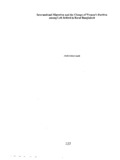International migration and the change of women's position among left behind in rural Bangladesh
Date
2000Publisher
BRAC Research and Evaluation Division (RED)Author
Hadi, AbdullahelMetadata
Show full item recordCitation
Hadi, A. (2000). International migration and the change of women’s position among left behind in rural Bangladesh. Research Reports (2000): Social Studies, Vol – XXVI, 122–136.Abstract
While the impact of remittances on the economic condition of sending communities has received much
attention, the effects of international migration on women's position among the left: behind have not been
adequately explored. This paper examines the changes of the left behind women's position at the family
level as a result of the migration of adult men to overseas. Data came from a demographic surveillance
system covering 70 villages in Bangladesh. All migrant families having at least one male member
working abroad for more than six months were identified in the study villages in 1996. A comparable
number of non-migrant families were selected at random from the same villages to yield a total sample of
1,030 families. In-depth interviews were conducted with adult women of the sample families. Findings
reveal that the overseas migration of adult males has a significant positive association with women's
decision making capacity and education of girls in the migrant families. The remittances as well as the
influence of secular values have reduced the practice of dowry in marriages. Multivariate analysis
suggests not only that remittances have increased the financial capacity of the migrant families, but also
that secular influences from overseas might have modified women's position when the role of other
socio-economic factors are controlled. The study concludes that overseas migration of adult men can
create a context for change of women's position in the traditional communities.

